#waldemar young
Audio
The infamous lost film arrives on the podcast with September's bonus horror adjacent episode.
This month we watch a reconstruction of Tod Browning's LONDON AFTER MIDNIGHT (1927) by producer Rick Schmidlin! The film stars Man of a Thousand Faces Lon Chaney in one of his most iconic disguises.
#podcast#london after midnight#mgm#metro goldwyn mayer#tod browning#lon chaney#irving thalberg#waldemar young#josegh w farnham#the hypnotist#marceline day#conrad nagel#henry walthall#polly moran#edna tichenor#claude king#merrit gerstad#tcm#rick schmidlin#lost film#horror adjacent#bonus episode
8 notes
·
View notes
Text
BLOGTOBER 10/5/2022: THE ISLAND OF LOST SOULS (1932)
Rewatching this movie had me looking up the history of mules. I guess we've been making them since before 1,000 BC, out of usually a female horse and a male donkey. (This is apparently easier than the other way around for some reason that I'm too lazy to sort out) We like them because, as George Washington put it, "more docile than donkeys and cheap to maintain"—that is, it's easier for them to get and keep a job. You may have guessed already that I'm siphoning all this off of Wikipedia, so I'll add without further worry of sounding especially educated that Charles Darwin wrote: "The mule always appears to me a most surprising animal. That a hybrid should possess more reason, memory, obstinacy, social affection, powers of muscular endurance, and length of life, than either of its parents, seems to indicate that art has here outdone nature". The thing about the mule, though, as with many interspecies hybrids, is that you usually have to make them from scratch because of an imbalance of partnerable chromosomes. Not much has changed in this regard since the time of Darwin, but we still consider the mule to be worth the effort.

Why the hell was I talking about this? …Oh, it was because of the difference between H.G. Wells' 1896 novel The Isle of Doctor Moreau, and its most successful adaptation, Erle Kenton's ISLAND OF LOST SOULS. Despite the 1932 film being pre-code, it is inevitably less aggressive about torture than its literary predecessor, which was in part inspired by the contemporary anti-vivisection movement of the latter 1800s. There is only so much Kenton (a former animal exhibitor, whatever that's worth to you!) could show, or maybe that he was willing to describe, in terms of what happens in rogue vivisectionist Dr. Moreau's dreadful "House of Pain". The book is focused on Moreau's idea that being motivated by pain is a primitive characteristic, and that his homemade humans can be perfected through exposure therapy. He laments the inevitable return of the bestial characteristics in his test subjects, but believes that his necessarily agonizing creation process will ultimately bring the results he craves: "Each time I dip a living creature into the burning bath of pain, I say, this time I will burn out all the animal, this time I will make a rational creature of my own."

As a refresher, the exiled Moreau (played in the film by Charles Laughton, who of course is EVERYTHING in this movie) is trying to make a his own humans from the raw material of various living animals. Protagonist Edward Parker (Richard Arlen) is appalled by this discovery when misadventure delivers him to the titular island, but he is still slow to pick up on the fact that the alluring Lota (Kathleen Burke, who also joined co-writer Philip Wylie on MURDERS IN THE ZOO) may be a product of Moreau's process, despite the doctor's suspiciously aggressive attempts to hook them up. With his fiancee Ruth (Leila Hyams) still over the sea, Edward is happy to sample the wares until he discovers Lota's feline claws. It seems that he was able to preserve his naivete because of Moreau's promise that Lota is "pure Polynesian", which to him justifies the fact that she has little more intelligence than a house cat; I'm sure there is abundant scholarship on themes of racism and miscegenation in ISLAND, but since I'm not in the know, I'll just leave that there for someone else to pick up. What Moreau seems mostly concerned about is the fertility of his creations (specifically, whether they can produce new humans), and when it becomes clear that Edward isn't going to consummate with his catwoman, the doctor is disappointed—until Ruth arrives to rescue her man, attracting the attention of lonely Beast Men. For better or worse, we don't get to find out whether that would make for a fruitful union, because of the inevitable uprising of the creatures (led by Bela Lugosi) against their monstrous creator.
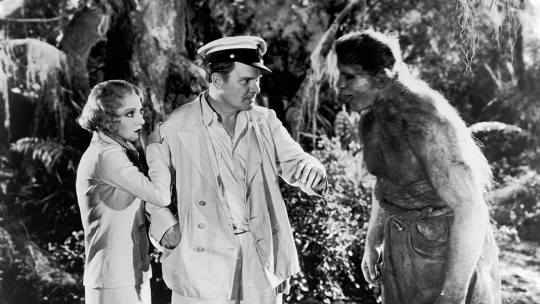
ISLAND OF LOST SOULS remains effectively disturbing after almost a century, but it's interesting to observe how it was censored. Themes of rape and forced parenthood were either a little too subtle to punish, or just not perceived as that big of a deal in the face of actual blasphemy. Sure, the vivisection element was problematic, but what really bothered censors was Moreau playing God. The British Board of Film Censors found the idea of humans controlling evolution "repulsive" and "unnatural", and in America the Production Code Administration insisted on the removal of any implication that Moreau had created the Beast Men himself. The film was also banned in multiple states just for its frank acceptance of the theory of evolution.

It's interesting how graphic sadism and sleaze can be upstaged so dramatically by ideological problems—although today we see a similar moral outrage on the part of audiences who demonstrate an increasing fervor for purely aspirational content. One hopes that people who condemn the ethical content of movies are paying equal attention to the new resurgence of book banning by authorities with whom young progressives would surely not wish to be identified. To my mind, it's perfectly natural to be offended by media, but the experience should be taken as more of an opportunity to explore your own feelings and context, than as grounds for wholesale rejection of the work in question.
Meanwhile, if you find yourself a little disappointed by the generically hairy dog- or ape-like appearance of the filmic Beast Men, versus their many and varied appearances in the novel, check this shit out!
#blogtober#blogtober 2022#horror#sci-fi#science fiction#the isle of doctor moreau#the island of lost souls#monsters#adaptation#charles laughton#richard arlen#leila hyams#kathleen burke#bela lugosi#philip wylie#waldemar young
6 notes
·
View notes
Text


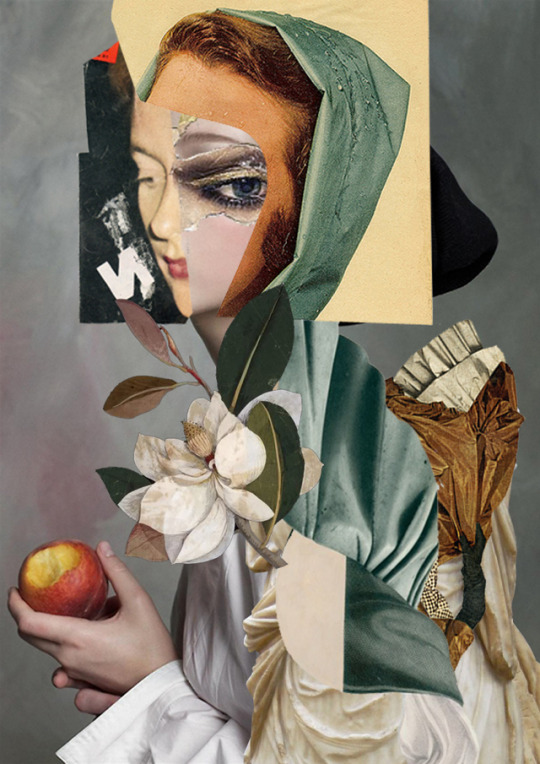

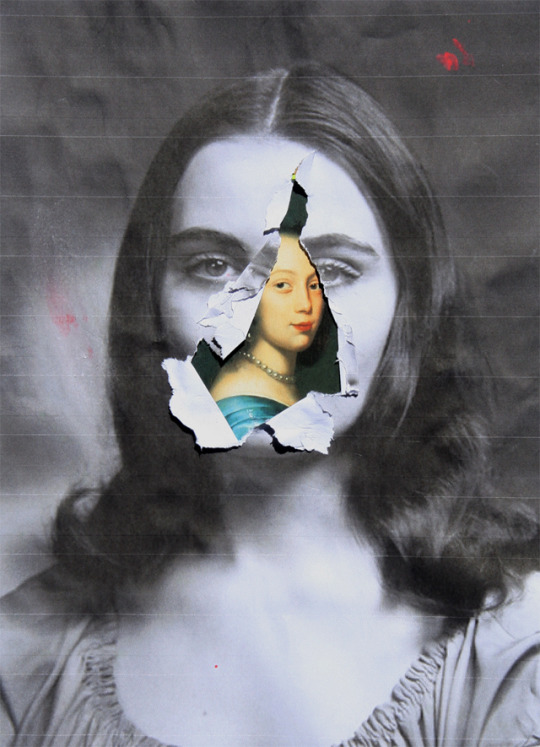


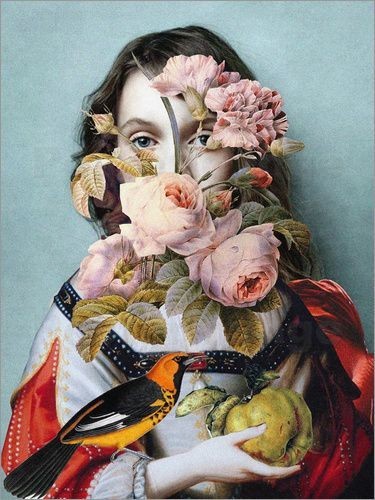

Waldemar Strempler
#waldemar strempler#art#artwork#girlhood#flowers#in the shadow of young girls in flower#dark academia#light academia#romantic academia#chaotic academia
3K notes
·
View notes
Photo





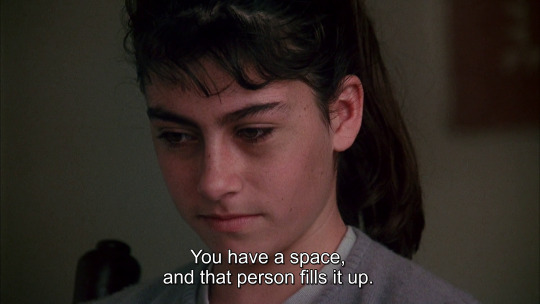
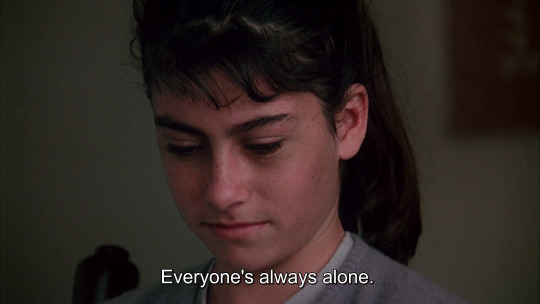



Testament (Lynne Littman, 1983).
#lynne littman#testament#testament (1983)#jane alexander#roxana zal#carol amen#john sacret young#steven poster#suzanne pettit#david nichols#linda pearl#waldemar kalinowski#julie weiss
38 notes
·
View notes
Text
Caleb aged up into a fussy toddler.
0 notes
Text
Subtext and Culture, Young Royals, Season 3, Episode 5
Episode 5 starts sometime after August dropped the bombshell about Erik at the end of last episode, and Wilhelm decides for some reason to visit the party palace, in order to make himself feel extra shit? I don't know what's going on here.
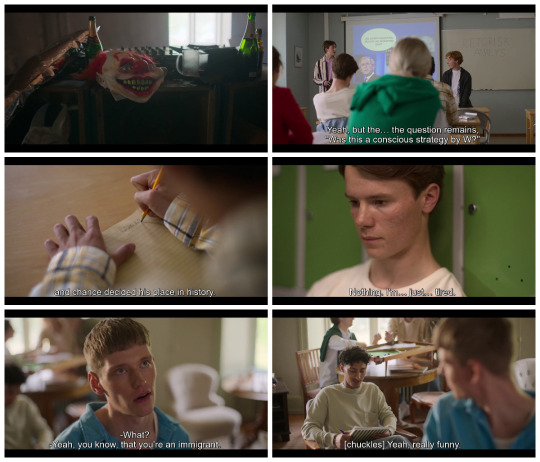
Blink and you miss it: Hey, that's one of the clown masks they used for Wilhelm's initiation back in season 1.
Blink and you miss it: Henry and Valter are doing a class presentation on rhetorical analysis, and for some reason they chose former US president George W. Bush as their subject, which is pretty hilarious given that he was a notoriously bad public speaker.
Blink and you miss it: Instead of asking Wilhelm, who is sitting right next to Simon, how he's feeling, he writes the question in his notebook and slides it over.
Subtext: Gotta keep up that facade and bottle all the negative feelings inside!
Lost in translation: Vincent uses the word "nyanländ", "newly arrived", which is the current politically correct way of saying immigrant.
Subtext: ...but in typical bully fashion he asks the target of the racist "joke" if it was funny, and Marwan obviously lies about it as to not upset Vincent.
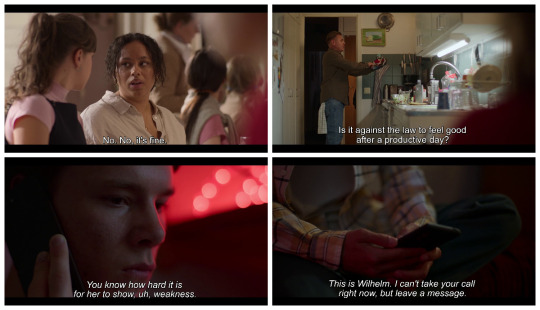
Subtext: Felice tries to play it off as no big deal, but she actually wants this opportunity to spend time with Sara without her other friends, in order to rebuild the friendship.
Subtext: Sara is right to be suspicious of her dad, because he is a lot more energetic than usual, and excuses his behaviour by him simply being in a good mood. It's probably his new medication that kicked in, though.
Subtext: Speaking of having a hard time showing weakness, that's exactly what Wilhelm's been struggling with by not telling Simon how upset he is about having learned that Erik took part in the gay porn initiation.
Subtext: So the whole subplot of the past four episodes was that the school locked up all the phones, and Wilhelm joined the little strike to get them back, pissing Simon off in the meantime, and now that they have their phones back he's not picking up when Simon is calling him? Not cool.

Culture: The choir is practising "En vänlig grönskas rika dräkt", a Swedish hymnal with text from 1889, but this version of the melody is from the 1930's and composed by Waldemar Åhlén. It's a very well-known summer song that pretty much every Swedish schoolkid has sung at some end-of-schoolyear summer assembly.
Cinematography: We're in the cursed music room, and this time the lighting is harsh and sharp, Wilhelm is in stark contrast to the rest of the room, there's no soft golden light smoothing things out, so we're gonna have an argument!
Subtext: Yeah, no, Wilhelm, sweetie, that's projection, that's what you are thinking about your brother. Simon isn't doing anything wrong here, he's just concerned about you being a moody asshole.
Cinematography: To illustrate how the relationship is going south, the music room which used to be full of instruments, is just getting emptier and emptier, and Simon is left standing alone at the piano.
Subtext: No, he's not feeling ok, and no, he's not interested in making up with Sara right now, because he's still angry at her.
Subtext: There are different kinds of homophobia, for example, there are people who talk loudly about how accepting they are of The Gays, but who react negatively when someone close to them comes out, because they were only fine with it at a distance. And then there are people who are ignorantly homophobic in general, but who turn out to be supportive of anyone close to them who comes out, because they know that that person isn't like The Other Gays. Shitty, but less shitty than the first group, and I think that's how Erik would have reacted had he known about Wilhelm.

Culture: In Sweden, you do the practical driving test in a car provided by the testing centre to make it fair and equal for everyone. These cars all have a red sticker saying they're for driving tests.
Subtext: Micke is failing exactly how he described it in an earlier episode. He's on new medication, it made him feel good and like he was in control, so he thought he could take just one beer with his friends.
Subtext: No, it fits horribly, and you can clearly see that it was on sale and that the price tag is still on it. But this is what Linda can afford.
Lost in translation: Simon actually says "jag vet", "I know", when Sara tells him that their dad let her down and that she is sad and upset about it.
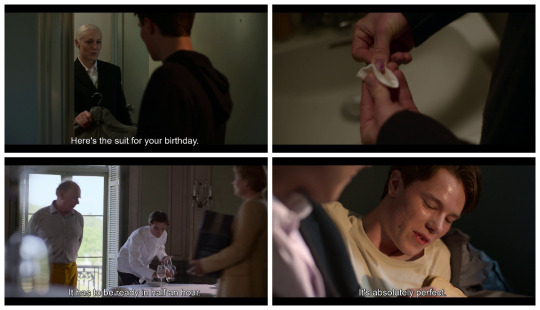
Subtext: Unlike Simon who got a cheap suit on sale, Wilhelm just has his perfectly tailored suit delivered to him by his bodyguards.
Subtext: Last episode Wilhelm picked a sport charity or something that he doesn't actually care about, because he thought it would best fit the narrative the royal court is going for. So now his internal homophobia is screaming at him to remove the nail polish, because it doesn't fit that image.
I don't know what this is: This has got to be an editing goof? This sequence of events doesn't work. Everyone else is up and about, preparing the third year's dinner with the teachers and they're even cooking the food with a chef, but it's early morning and Wilhelm is still sleeping in? Anyway, the whole thing is yet another example of how the school teaches hierarchy. As a younger student you service the older students, and when it's your turn to graduate, someone younger will service you.
Throwback: Aww, Simon made Wilhelm a sandwich, just like Wilhelm made one for Simon a bunch of times in previous seasons.
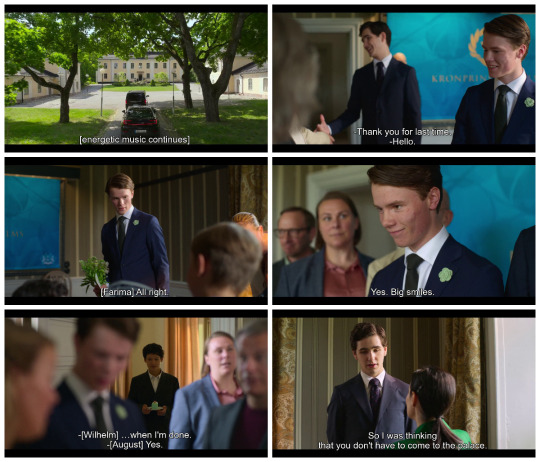
Culture: Man, early summer in Sweden is beautiful, isn't it? This was shot at Åkeshofs Slott in Stockholm, and if you do a 180 turn on that path, you'll see the subway station Åkeshov, and if you go through the tunnel under the road and then up to your right, you'll end up at a sports centre where I went twice a week as a kid for fencing training!
This tumblr is now about French school fencing! Doublé! Riposte!
Subtext: Time and time again the show has shown us how much August loves this shit, and that he wasn't lying when he said he knew everyone, because clearly he does!
Subtext: And to show how much Wilhelm dislikes this shit, he is so stiff when talking to the invited kids who are actually benefitting from his charity foundation, while August just immediately jokes around with them and is much more comfortable.
Culture: I've seen how a lot of fans think that the flower Wilhelm is wearing is a green carnation, which is a symbol for being gay, popularized by Oscar Wilde. I don't think so, that's not a thing in Sweden as far as I know. Instead, I think it's an alternate version of a Majblomma, which is an actual Swedish charity thing, where you can buy these plastic lapel flowers from schoolkids to show your support around this time of year.
Subtext: Even though Simon is there, he's being shoved to the back, because his presence doesn't fit the narrative. If Wilhelm instead had chosen to start some kind of LGBT charity, Simon would have had a much more prominent role. Oh, and poison or not, that Princess Cake looks delicious!
Subtext: Farima is expertly letting August down, who of course pretends that he's not the least bit disappointed at being excluded from having dinner at the royal palace.
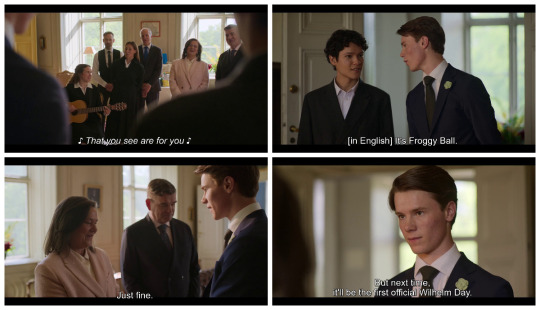
Blink and you miss it: IT'S LISA! HI LISA!
Culture: Kalle Stropp och Grodan Boll are two characters from a radio show for kids from the 1940's, but they've also been featured in books, comic books, a live action movie, and animated cartoons. It's about the two titular characters, a cricket and a frog, and their adventures. The last movie was made in the 1990's though, so I'm not so sure kids these days knows who these characters are. Personally, I can't hear this song without hearing their silly character voices.
Subtext: The Queen is still keeping up appearances and lying through her teeth about how she's actually feeling.
Culture: In real world Sweden, Victoriadagen is celebrated in mid July when Crown Princess Victoria has her birthday, she hands out a sports award, there's a concert, some charity stuff, and you can sort of meet the royals or sing her happy birthday or something.
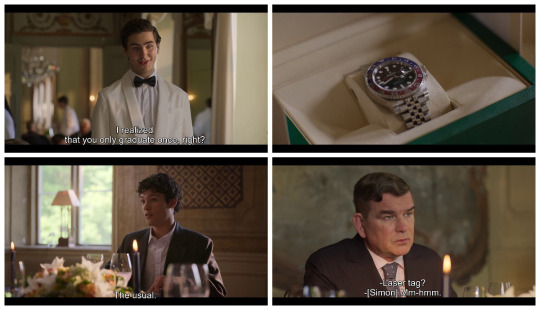
Subtext: August is repeating the excuse Farima used on him as to why he didn't attend the birthday dinner.
Blink and you miss it: That's a Rolex Oyster Perpetual GMT-Master II. It's only about $10,000 and change.
Subtext: Simon, sweetie, I don't think the royals have any clue as to what "the usual" means when you're describing how regular people celebrate birthdays.
Culture: Simon actually says Laserdome, which is a company in Sweden that has been running laser tag arenas since the 1990's. I had no idea they still existed!
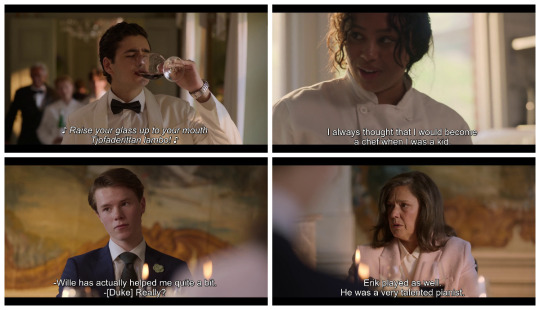
Culture: They're singing Lambo, a drinking song for students. It's a challenge song, so while the rest of the table sings, the target has to finish their glass, correctly sing the response lines, and turn the glass upside down over their head. If you fail, like August does in this scene, you have to do a penalty round and chug another glass.
Subtext: ...before her parents heaped all of their family's expectations on her. But maybe if Felice can break free she could pursue her actual dreams?
Throwback: Remember the scene in S1E3 when Simon is practising the Hillerska song in the music room?
Subtext: Queenie, sweetie, you're not looking Wilhelm in the eyes, you're not engaging in the discussion, and the only thing you do is to talk about Erik every chance you get. No wonder Wilhelm has had enough and explodes at his parents.
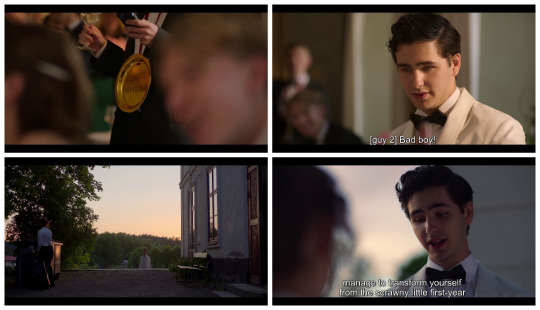
Blink and you miss it: Vincent won the "Daddy pays" award. Pappa betalar.
Subtext: In this context the award just means that he's the image of a bad boy, a player. But throughout the season, August has been struggling with whether or not he's actually a bad person, which is why he's not exactly happy with the award.
Cinematography: Fuck me that's a pretty shot of a typical summer sunset. In late May in the Stockholm area, sunset happens at around 9:30 in the evenings.
Subtext: One more explanation for August's body dysmorphia is that he got bullied for being weak and scrawny when he first started at Hillerska, so he decided to start working out more.
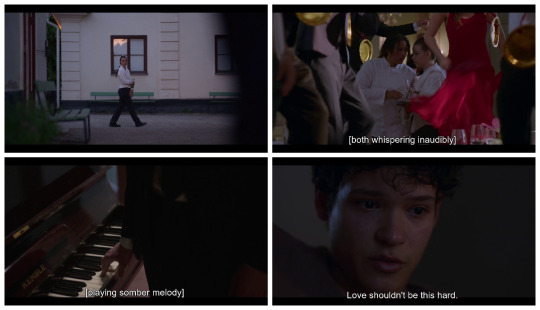
Blink and you miss it: The reason Fredrika is outside and happens to see Sara and August kiss, is because she's trying to sneak away the bottle of wine she stole earlier from the kitchen.
Subtext: And the reason Felice looks upset when Fredrika tells her what she saw is because she truly thought Sara was over August, and that's a condition of them reconciling.
Blink and you miss it: Wilhelm plays the first few notes of the original Hillerska song.
Subtext: And to cap off this terrible no-good horrible cliffhanger episode, Simon breaks up with Wilhelm by repeating the words his mom said to him earlier in the episode.
157 notes
·
View notes
Text
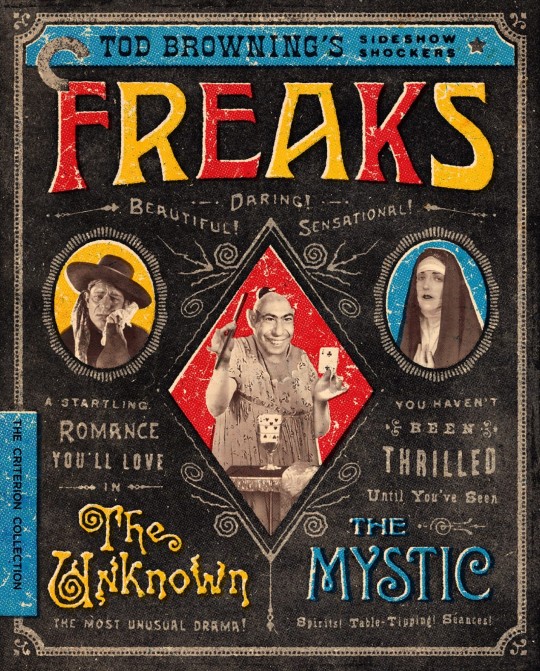
Tod Browning's Sideshow Shockers will be released on Blu-ray and DVD on October 17 via The Criterion Collection. The set collects three films directed by Tod Browning: Freaks, The Unknown, and The Mystic.
Freaks (also known as The Monster Story, Forbidden Love, and Nature's Mistake) is a 1932 horror film written by Willis Goldbeck and Leon Gordon. Wallace Ford, Leila Hyams, Olga Baclanova, and Roscoe Ates star.
The Unknown is a 1927 silent horror film written by Waldemar Young. Lon Chaney, Norman Kerry, Joan Crawford, and Nick De Ruiz star.
The Mystic is a 1925 silent drama film written by Browning and Young. Aileen Pringle, Conway Tearle, and Mitchell Lewis star.
Freaks has been digitally restored in 2K with uncompressed monaural sound. The Unknown has been digitally reconstructed and restored in 2K with a new score by composer Philip Carli. The Mystic has been digitally restored in 2K with a new score by composer Dean Hurley.
Raphael Geroni designed the cover art. Special features are detailed below.
Special features:
Freaks audio commentary by film scholar David J. Skal
The Unknown audio commentary by film scholar David J. Skal
The Mystic introduction by film scholar David J. Skal
Interview with author Megan Abbott about director Tod Browning and pre-Code horror (new)
Freaks archival documentary
"Spurs" - Reading of Tod Robbins' short story on which Freaks is based
Freaks prolgue, added to the film in 1947
Freaks alternate endings featurette
Freaks portrait video glalery
Essay by film critic Farran Smith Nehme
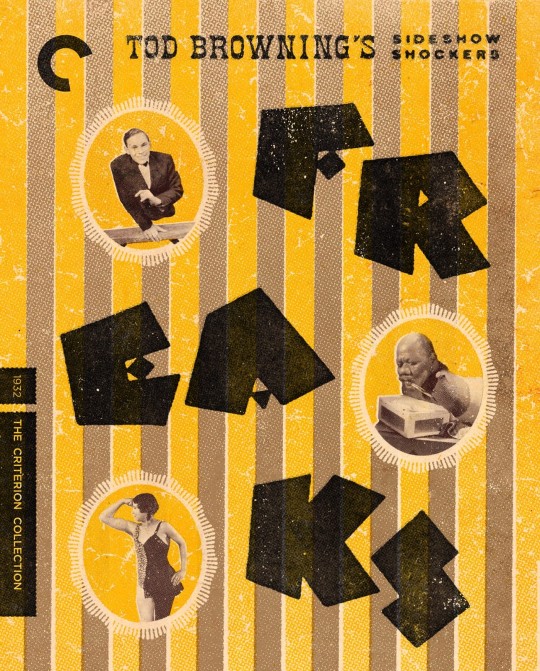
The most transgressive film produced by a major American studio in the 1930s, Tod Browning’s crowning achievement has haunted the margins of cinema for nearly one hundred years. An unforgettable cast of real-life sideshow performers portray the entertainers in a traveling circus who, shunned by mainstream society, live according to their own code—one of radical acceptance for the fellow oppressed and, as the show’s beautiful but cruel trapeze artist learns, of terrifying retribution for those who cross them. Received with revulsion by viewers upon its initial release, Freaks effectively ended Browning’s career but can now be seen for what it is: an audacious cry for understanding and a singular experience of nightmarish, almost avant-garde power.

The most celebrated and exquisitely perverse of the many collaborations between Tod Browning and his legendary leading man Lon Chaney, The Unknown features a wrenchingly physical performance from “the Man of a Thousand Faces” as the armless Spanish knife thrower Alonzo (he flings daggers with his feet) whose dastardly infatuation with his beautiful assistant (Joan Crawford)—a woman, it just so happens, who cannot bear to be touched by the hands of any man—drives him to unspeakable extremes. Sadomasochistic obsession, deception, murder, disfigurement, and a spectacular Grand Guignol climax—Browning wrings every last frisson from the lurid premise.

A fantastically atmospheric but rarely seen missing link in the development of Tod Browning’s artistry, set amid his favored milieu of shadowy sideshows and clever criminals, The Mystic provides a striking showcase for silent-era diva Aileen Pringle, who sports a series of memorably outré looks (courtesy of art-deco designer Erté) as Zara, a phony psychic in a Hungarian carnival who, under the guidance of a Svengali-like con man (Conway Tearle), crashes—and proceeds to swindle—American high society. Browning’s fascination with the weird is on full display in the eerie séance sequences, while his subversive moral ambiguity extends surprising sympathy to even the most seemingly irredeemable of antiheroes.
#tod browning#freaks#the unknown#the mystic#criterion#the criterion collection#criterion collection#dvd#gift#raphael geroni#horror#classic horror#lon chaney#joan crawford#silent horror
114 notes
·
View notes
Note
It's well known how much Alexander loved & trusted Hephaestion, even when Alexander developed trust issues & paranoia later on in his life. But there was one instance where Alexander perhaps couldn't even trust Hephaestion, it was when he didn't give Hephaestion full command of the Companion Cavalry, if I'm not wrong. How do you think Hephaestion felt when he saw Alexander not even trusting him? It's almost shocking to imagine Alexander not having faith even in Hephaestion!
Hephaistion didn't get command of the full Companion Cavalry less as a matter of trust than a matter of politics.
Remember, he was still relatively young, one of the (as Waldemar Heckel likes to call them) "New Men." To give him SOLE command of THE most prestigious unit in the army would have been a very bad diplomatic blunder. Appointing Kleitos along with him is a nod to the noted officers and prior command structure that Philip had already established. In the wake of a conspiracy against Alexander's life, it was simply pragmatic on his part. Don't alienate the old guard.
Yet Kleitos also had a personal connection to him, so he believed he could count on his loyalty in a way he couldn't with Parmenion's family. (Parmenion had been loyal to Philip, not necessarily [as much] to Alexander.)
Yet this dual appointment didn't last long. Following his father's earlier moves, Alexander continued destabilizing the old Great Family feudal system by elevating advancement due to ability, not birth (which tied men to the king, not their local canton governor or other Hetairos overlord). If he couldn't touch the main commands immediately after Gaugamela, he reorganized lower-level ones either late in 331 or early in 330. The death of Philotas (and Parmenion) opened the way to make other changes by 329.
So, if Hephaistion (not a member of traditional Macedonian elite society) was advanced, he also advanced Kleitos. THEN about a year and a half/two years later, he reappointed Kleitos as satrap of Baktria (which he likely didn't want), and used that reappointment to completely reconfigure the Companions into not one unit under (now) 2 people, but 6 Hipparchies under 6 different commanders. Hephaistion held the chief position (where the agema, or Royal unit served), but was still only one of the 6.
Did Alexander already have this in mind when he reassigned Hephaistion and Kleitos as commanders ... probably not in the fine details, but yes, I think he was aiming for major shakeups. He just couldn't do them all at once.
#asks#Hephaistion#Companion Cavalry#Alexander the Great#ancient Macedonia#Macedonian military#Hipparchies#Kleitos#Cleitus#Classics
11 notes
·
View notes
Text

@/iMiaSanMia: Julian Nagelsmann: "Ilkay Gündogan remains captain. But Manu's word will continue to have weight. The captain is intended to be a contact point for his teammates. Players should feel like they have a leader in their ranks. He’s a representative of the team"
On Hummels being dropped: Mats hasn’t played as much recently as before. We now have a different system and one less centre-back. There are currently other players there. I don't see Mats as the ideal choice. It’s not always just about finding the best players, but perhaps simply the most suitable ones.
On who will start in goal in the next two games: We will have a conversation with both of them [Neuer and ter Stegen] - and then decide.
On dropping Goretzka: The decision was not between Pavlović and Leon. Leon's last few games have been much better, that's right. It's about finding the right players for the roles, I see other players ahead at the moment. We had others in mind. Through very good performance and an understanding of the role, the door is not closed. It wasn’t a pleasant conversation [with Goretzka], as you can imagine, but you have to make decisions.
On Pavlović: He has shown very strong performances recently. He was one of the best players at Bayern. Of course this was not a political decision. We didn't have to convince him. That was the consequence of the performance principle. We'll see whether it'll be enough for the Euros. He talks in the dressing room and doesn’t hide despite his young age.
On his future: I currently have a contract with the DFB until after the European Championships. I don't have any other contract available. My full focus is on the European Championships and the national team.
But, Nagelsmann is definitely thinking about his future: I would advise that to anyone whose contract is about to expire.
On Thomas Müller: He’s been playing a lot recently. He knows what his role is, he knows what importance he can have in each role. Thomas could also settle for a spot off the bench. He already knows the role at FC Bayern. Thomas is a player who also has a role off the pitch. He is an intelligent player who doesn’t focus on himself but on the team.
On Kroos' comeback: He is very important, but also not the sole savior. He knows what he can do. On the other hand, he also knows what he can't do. He has a very good instinct, a good calmness. He can be a brilliant link between defense and attack. There is always this expression in Germany “Querpass-Toni” [sideways pass Toni] - Anyone who says that knows nothing about football. I'm extremely happy that after many conversations I persuaded him to come back. I give him credit for that.
On 4 Stuttgart players called up: That’s also momentum. This year they are doing very, very well. I could have called two or three more from VfB. Waldemar Anton is a very good defender, also with an offensive urge. He won't demand to play every game from the start, but he'll still give it his all. Maxi Mittelstädt is currently the most stable left-back in the Bundesliga. Statistically speaking, he is by far the best left-back in the Bundesliga. Chris Führich is an extremely valuable player, with 1v1 and good finishing, that can be key if we need a goal. Deniz Undav has a great ability to read spaces. He runs a lot, is hard-working and has a good nose for goal.
On Jan-Niklas Beste: He can play an offensive role but also at the back and can play left-back without any problems. Plus he is an exceptional set piece taker. He deserved the nomination with the goal involvments he has.
Nagelsmann says Rüdiger and Tah will be the starting CB duo: Toni and Jona are initially the starters in central defense. They can confirm this through good performances.
On BVB players (except Füllkrug) being dropped: The assessment is not always about talent. I spoke to Edin (Terzic) and Sebastian Kehl on the phone, I can imagine that neither of them are happy. I think other players have better momentum. Everyone knows what it will take to get back in. From the discussions we had, they know what is missing so that they can be called up for the Euros. The player decides at the end. I’m just the executive body. Julian Brandt was a tough decision, Führich probably has the better momentum at the moment.
#germany nt#german nt#dfb team#140324#julian nagelsmann#ilkay gündoğan#manuel neuer#mats hummels#marc andré ter stegen#aleksandar pavlovic#leon goretzka#thomas müller#toni kroos#waldemar anton#maximilian mittlestädt#chris führich#deniz undav#jan-niklas beste#antonio rüdiger#jonathan tah#niklas füllkrug#julian brant
9 notes
·
View notes
Text
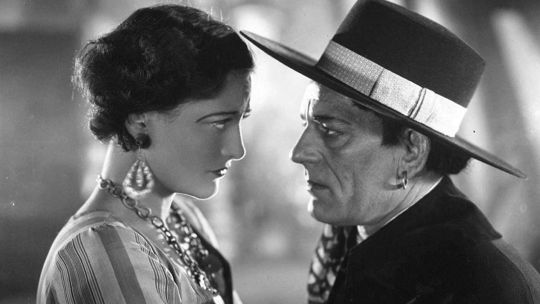
Joan Crawford and Lon Chaney in The Unknown (Tod Browning, 1927)
Cast: Lon Chaney, Joan Crawford, Norman Kerry, Nick De Ruiz, John George, Frank Lanning. Screenplay: Tod Browning, Waldemar Young, based on a novel by Mary Roberts Rinehart; titles: Joseph Farnham. Cinematography: Merritt B. Gerstad. Art direction: Richard Day, Cedric Gibbons. Film editing: Harry Reynolds, Errol Taggart.
One of the kinkier movies in the Lon Chaney filmography, The Unknown betrays its pre-Code nature very early. It's set in a circus where we see women in the audience ogling a performance by the strong man, Malabar (Norman Kerry). But the mother of one of the oglers, sitting across the aisle, hisses at her son to "go home and take off that dress." Chaney plays Alonzo, whose knife-throwing act involves his lovely assistant, Nanon (Joan Crawford), the daughter of the money-grubbing Zanzi (Nick De Ruiz), owner of the circus. What makes Nanon's job more perilous is that Alonzo throws the knives with his feet, being armless. Eventually Alonzo's attraction to Nanon will involve murder, dismemberment, and a love triangle in which Alonzo almost tears his rival, Malabar, to pieces. Chaney's gift for physical transformation reaches a new peak in the movie, which requires him to do everything from throwing knives to drinking from a teacup with his toes. In fact, although Chaney learned to do many of these things, some of the actions were performed by his body double, Paul Desmuke, who was in fact armless. Careful camera manipulation kept Chaney's upper body in the frame as Desmuke actually lit cigarettes and threw knives with his feet. The Unknown was one of Crawford's earliest featured performances, in a role that MGM originally wanted Greta Garbo to play. She's still a little raw as an actress, but her presence outshines that of her leading man, Kerry, whose career fizzled as hers ignited. The Unknown, one of eight movies director Tod Browning made with Chaney, lacks the sympathy for the physically divergent of Browning's most notorious film, Freaks (1932), although Alonzo's dwarf assistant, Cojo (John George), sometimes serves as the moral corrective to Alonzo's schemes.
9 notes
·
View notes
Text
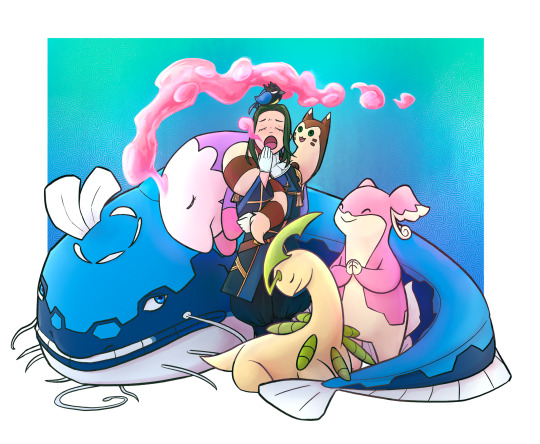
Linhardt von Hevring + Pokemon Crossover.
Pokmeon backstories under the cut!
Rookidee (Genevieve): Linhardt's first Pokemon, given to him as a symbol of Adrestian Nobility and his role as the heir to house Hevring. He has no intention of evolving her, as he finds her better company and far more useful so small.
Musharna (Yu): As a Munna, Yu was attracted to Linhardt's constant dreaming. At first Linhardt was annoyed at her snuggling up to him and affectionately bumping him, but came to appreciate that her presence caused him to have only pleasant dreams. Though she still only responds to Yu, as for the first little bit he only addressed her with "you".
Dondozo (Don Juan): It was all Caspar's idea to go out and catch a Tatsugiri and Dondozo together, but originally Linhardt captured the Tatsugiri, which he deemed a more manageable size. However, when he and Caspar discovered the Pokemons' personalities better suited the other, they traded. Linhardt now mostly just enjoys naps on her back as she floats in large bodies of calm water. As much as he's tried to get her to respond to a different name, Don Juan prefers the nickname Caspar gave to her.
Furret (Pillow): After reading about how Furret curl around their young when they sleep, and how wonderfully soft their fur is, Linhardt went out to capture his own personal pillow. The only other time anyone has seen him move so fast is when he is returning to his room for a nap. Pillow, for her part, seems content with the arrangement.
Bayleef (Jasmine): A gift from his father, chosen specifically because of the invigorating effect the aroma the species' leaves is supposed to have. In a comedic turn of events, Jasmine possesses a rare genetic mutation that causes her leaves to have a relaxing effect instead.
Audino (Waldemar): Those who achieve the highest rank of White Magic study at Garreg Mach Monastery receive one of three Pokemon prized for their healing capabilities. Linhardt often finds himself wishing he had chosen one of the other options, as Waldemar likes to wake up early and be productive. Linhardt nicknamed him after his father to reflect their similar mindsets.
#linhardt von hevring#pokemon crossover#fire emblem three hopes#fire emblem three houses#fe3h#my art#mine#rookidee#musharna#dondozo#furret#jigglypuff#audino#more than half his pokemon have their eyes closed and that's absolutely on purpose
53 notes
·
View notes
Text

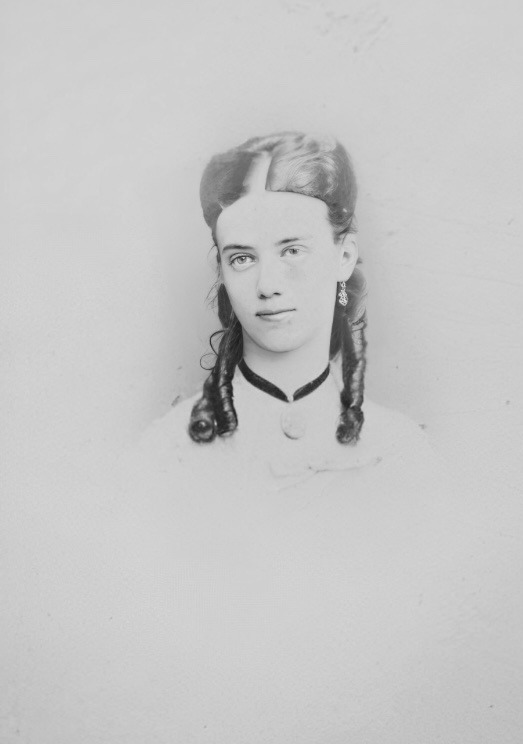
”The youngest of families tends to be treated with special tenderness, and that was the case here as well. Both the parents and the entire Danish people loved the young Prince [Waldemar] and Princess [Thyra], […] As also the youngest of the capital's "favourites", Princess Tyra, left her childhood home to take her place by the Duke of Cumberland's side, there was sorrow mixed in the festive atmosphere.”
Kong Christian IX; Et mindeskrift by J.C Jorgennsen & co, 1906.
#Princess Thyra of Denmark#Danish Royal Family#Royalty#Royal History#House of Hanover#Thyra of Cumberland#Sweet Thyra… :’(
24 notes
·
View notes
Photo
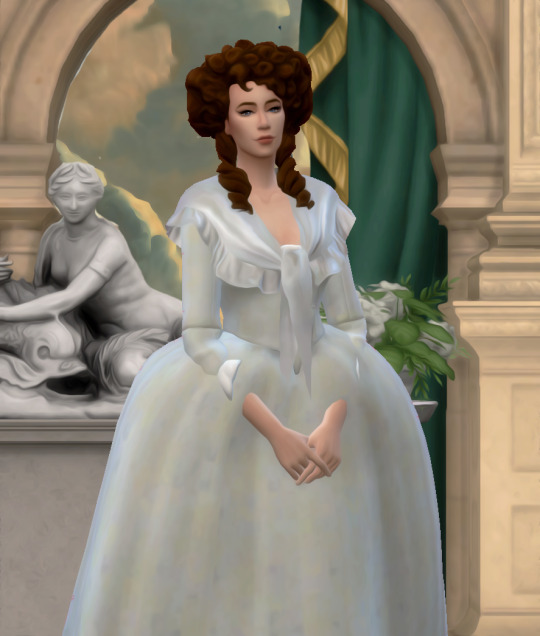
Her Royal Highness Princess Elisabeth of Norden, Grand Princess Alexander of Weimar (1767-present)
Princess Elisabeth of Norden was born in 1767 to Karl Duke of Norden and Princess Helene of Vasa at the Brunsbuttel Palace. Elisabeth was christened in the Brunsbuttel Palace Chapel as Elisabeth Christine Margaret Henrietta with her aunts Adelaide and Viktoria as her godmothers and her uncle Charles Gustaf King of Vasa as her godfather. Elisabeth was raised at the Brunsbuttel Palace alongside her other sisters Josefina, Maria Theresa, Paulina, Louise, and Viktoria. Helene did not consider Elisabeth a great beauty like her other siblings and often found her to be needy in her childhood. Elisabeth was a skilled horseback rider and often raced her younger brother Waldemar at their father’s summer residence Schloss Bentswich. Elisabeth remained in Norden for majority of her childhood and never attended the opulent weddings of her older sisters as she was considered too young. Elisabeth was close to her older sister Princess Louise and her younger sister Viktoria. Elisabeth quarreled with her mother frequently and proved to be a bad influence on her sister Viktoria. When her older sister Maria Theresa died and her mother Helene and sisters Paulina and Louise left the Norden Court she briefly became the senior lady of the court. However, her sister Louise came back shortly and later after that her mother Helene and sister Paulina would return. Elisabeth was deeply affected by the death of her father in 1784 and her resentment for her mother grew even deeper. Helene lost hope in finding marriages for her children after her husband’s death and began to neglect her younger children. Elisabeth thought that she was finally free and did not have to marry. However, her aunt Adelaide of Norden decided to find a match for Elisabeth herself. In 1786, Elisabeth was married to Grand Prince Alexander of Weimar, the youngest brother of the King of Weimar. Alexander had three children from his previous marriage, Grand Princess Charlotte, Grand Prince Matthias, and Grand Prince Henry. Alexander had been 10 years older than her and hated being around him. Elisabeth found the court of Weimar to be boring. Elisabeth became a surrogate mother to her husband’s children from his previous marriage and raised them alongside her daughter Grand Princess Frederica born in 1787. Following the birth of her daughter, Elisabeth moved to a residence far from the Weimar Court, known as Schloss Rastatt with her step-children and daughter. In 1794, Elisabeth started an affair with her husband’s private secretary, the Count of Bretten. Elisabeth’s husband discovered the affair in 1796 and threatened to take away custody of their children. Elisabeth refused and ran away with her children to Norden where she sought sanctuary with her brother Wilhelm. Wilhelm was very sympathetic to his sister’s situation and wanted to let her stay in Norden but legally she was required to return to Weimar. Wilhelm did not want this situation to turn into a conflict with the powerful kingdom of Weimar and so he turned her over to her husband Alexander two months later. Elisabeth was put into strict supervision at the Ludwigsburg Palace and shunned by the court who were embarrassed by the scandal that she caused. Elisabeth requested her brother-in-law the King of Weimar for a divorce from her husband but he refused and threatened to send her to a convent and take away her children if she did. Elisabeth stayed in her gilded cage at the Weimar Court in Ludwigsburg Palace and remained unhappy. News of Elisabeth’s scandal spread throughout the continent and tainted the image of the Norden Family. Elisabeth was not even allowed at the marriage of her step-children or her daughter Frederica. Elisabeth’s own sisters turned on her following the scandal besides Viktoria. Viktoria visits Elisabeth frequently and represented her at the wedding of Elisabeth’s daughter Frederica to the Prince of Holbein.
#SophieOfRostock#sor#sims4#ts4#the sims#sims4 story#sims 4 royals#sims 4 royalty#ts4 historical#ts4 history#ts4 royals#s4 royalty#s4 history#historical#royalty#royals#history#rococo
63 notes
·
View notes
Text
Dread by the Decade: Island of Lost Souls
👻 You can support or commission me on Ko-Fi! ❤️

Source Material: The Island of Doctor Moreau by H. G. Wells
Year: 1932
Genre: Sci-Fi Horror, Creature Feature
Rating: UR (Recommended: PG-13)
Country of Origin: United States
Language: English
Runtime: 1 hour 10 minutes
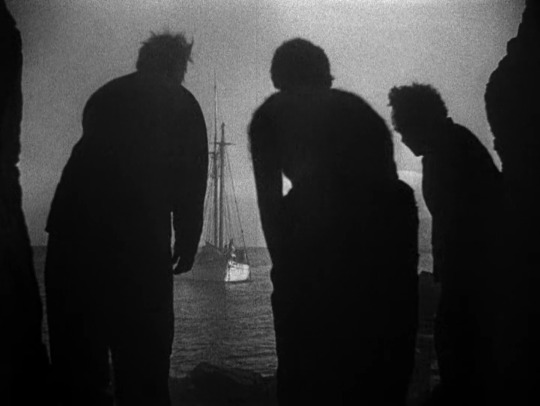
Director: Erle C. Kenton
Cinematographer: Karl Struss
Writers: Waldemar Young, Philip Wylie
Cast: Charles Laughton, Richard Arlen, Arthur Hohl, Kathleen Burke, Leila Hyams, Stanley Fields
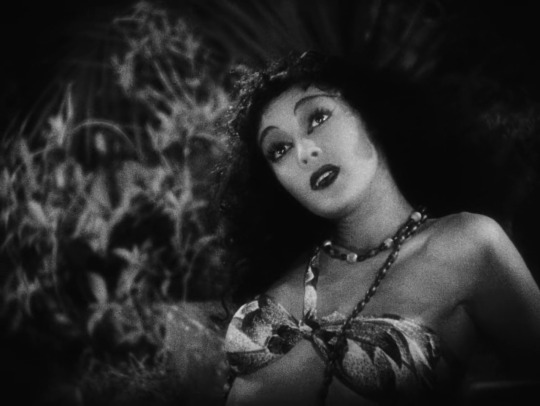
Plot: A shipwrecked sailor finds himself on an island where a mad doctor is blurring the lines between man and beast.
Review: Provocative and strange, Island of Lost Souls raises ethical questions, before providing its own deeply unsettling answers.
Overall Rating: 4/5

Story: 4/5 - An intriguing exploration of science without morals and what it means to be human. Hampered some by the reductive portrayal of the islands' occupants and potentially racist undertones.
Performances: 4/5 - Laughton is a delightful mix of campy and sinister, and balanced well by Hohl's somberness. The rest of the cast is sympathetic, with Fields' arc being my favorite.
Cinematography: 4.5/5 - Gorgeous use of shadows.
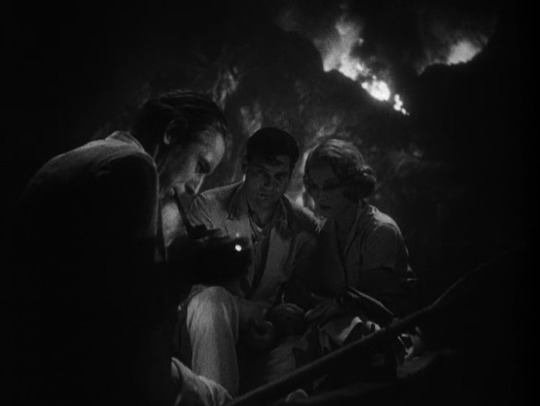
Editing: 4/5
Effects: 4/5 - Well employed fog and fire.
Sets: 5/5 - A mix of real locations and sets, with the wild jungle encroaching upon Moreau's tidy compound reflecting his own melding of nature and science.
Costumes & Make-Up: 5/5 - The creature makeup for this film was very innovative. The one-hoofed man was especially great.
youtube
Trigger Warnings:
Moderate violence (largely off-screen)
Misogyny (uncritical)
Disturbing themes of animal/human experimentation
Body horror
Torture and medical abuse (largely off screen)
It is implied that a character wants a woman to be raped
#Island of Lost Souls (1932)#Island of Lost Souls#Erle C. Kenton#American#sci fi horror#science fiction#creature feature#Dread by the Decade#review#1930s
13 notes
·
View notes
Text




Happy 54th Birthday to Prince Joachim of Denmark!
Born on 7 June 1969 in Copenhagen, Prince Joachim Holger Waldemar Christian is the younger son of Queen Margrethe II of Denmark and Prince Henrik. He is currently sixth in line to the Danish Throne.
On 24 May 2008, Prince Joachim married Marie Cavallier in the Møgeltønder Church on the day marking the 73rd anniversary of the wedding of his grandparents, King Frederik IX and Queen Ingrid of Denmark.
He has four children, Count Nikolai (b. 1999) & Count Felix (b. 2002) - with his ex-wife Alexandra, Countess of Frederiksborg and Count Henrik (b. 2011) and Countess Athena (b. 2015) with Princess Marie.
He is a patron of a number of charities and organizations like Main Organization For Reserve Personnel in Denmark, CARE Denmark, Fjord & Baeld, Young Scientists, Food Tech etc.
Prince Joachim and his family currently reside in Paris where he is working as a Military Attaché, Royal Danish Embassy. However, the family will soon be relocating to Washington DC where the Prince begins a new position under the Ministry of Defence as defence industry attaché at the Embassy of Denmark from September 1st.
#prince joachim#princess marie#happy birthday joachim#joachim's 54th birthday#my edit#prince nikolai#count nikolai#prince henrik#count henrik#princess athena#countess athena#prince felix#count felix#7062023#royal birthdays 23#royal birthdays#danish royals#danish birthday portraits#danish official portraits#danish royalty#danish royal family#official portraits
23 notes
·
View notes
Note
It's funny that the “dead siblings” aspect of Edelgard's backstory manages to, in spite of how under-developed and under-written it is, be so wildly contradictory that the only way for it to make any sense with the rest of what we know about her past is to assume that she made all that up in order to gain sympathy points from Byleth; it's almost certainly not what the writers intended, and i don't doubt for a second that Hopes contradicts that theory somewhere, but whatever makes Fódlan make more sense.
Apparently in Nopes they don't know they died or it's just a "rumour"?
Then what, they were all hiding or partying very far away, when their sister became Emperor, over Hans 2's claim? Seriously?
I don't really understand the obsession the devs had with making Adrestia a muddled mumbo jumbo -
we are told Ionius tried to centralise power on itself, the lolcalisation tried to erase it but we're in 2023 : Ionius wanted to get rid of the consort kin system, women feel like they can't inherit a thing, the Emperor (at least the one during the Southern Church incident) takes very badly any "revolts" and get rid heirs he doesn't like, personally appoints people, Ionius erased Hyrm (to the last blood descendant!) and sent his army and funky mages to Ordelia - outside of Adrestia!
Some nobles like to hear young women "sing" and if they can't pay for "singing lessons" they will pay for young men instead.
Adrestian Nobles, unlike their northern barbarian counterparts, stay holed up in their capital, and rarely return to their duchies/lands/territories.
The devs, from this, tried to paint a land where corruption is rampant, a sort of epitome of decadence complete with ASOIAF's "if you need to say you're the king chances are no one thinks you are the king" with Ionius's bids to centralise power on himself, in a nutshell : this Adrestia is rotten, the decadent version of the one sang about in praises or mentionned in old legends.
And yet, even if they describe the land as completely bonkers and everyone more or less is in for their own hide... Adrestian Nobles, the very same ones we're told hired Doro to hear her song, cannot be depicted too badly, because, hey, we're working with them.
Sure, we don't hear Leopold and Waldemar went to the brothel - i mean to the Opera - to hear popular young songstresses sing. But Leopold'n'Waldemar were depicted as corrupt nobles, only in for their money or own gain as the reason why they sided with Aegir to get rid of Ionius, and from what we know of Leopold, he wasn't picking roses and daisies in Brigid too.
And yet, because they magically became allies of Supreme Leader, all the issues that could be laid at the feet of Imperial Nobles, especially theirs as the most important nobles of them all, are... absent.
No one ever asks Leopold'n'Waldemar were are the other imperial children, or why they betrayed Ionius. No mention of Leopold, the Minister of War and a seasoned fighter, having personally trained Hans 2 or maybe acknowledging his talents as a warrior - or lack of compared to Supreme Leader's, no, nothing.
Asking Leopold why Caspar isn't his heir, even if he doesn't have a crest, since he shown great abilities to fight? No, never.
In the end, we see those crap nobles, but we never tell anything or do anything with them. Ionius was yeeted away in Nopes (maybe because including Ionius in the story, who was betrayed by Leopold'n'Waldemar, wouldn't have worked with the idea of making them Supreme Leader's allies) and Aegir is never given any voice to the chapter, or when he is, it's to be a living retcon - he wanted to take part, just like Leopold'n'Waldemar, in Supreme Leader's MAGA war, when he rebelled against Ionius who centralised power on himself? To MAGA? - because nothing should "taint" our vision of the heroine.
FE16 already teased Supreme Leader's version of the Insurrection being horse dung when Hanneman told Hubert he doesn't know what Vestra Sr rebelled, and how Vestra Sr rebelled because there was something, rather, someone, more important to him than eons of loyalty to the Hresvelg family.
Is it the same "reason" that made Arundel, when he was still Volkhard, put his niece to safety - in the kingdom !!! - with her mother, before being Slithered.
Those clues, complete with the Ferdie paralogue in SS - of course unavailable in CF - reveal that while Ludwig is a piece of slime, he isn't the piece of slime depicted by Supreme Leader (that'd be her Uncle) ; hell, all of Ludwig's actions (both in that paralogue and the experiments on the Hresvelg kids) were done by Thales, with Ludwig as his scapegoat.
So why? What is the truth behind the Insurrection, and behind Ludwig's role?
Is Adrestia deliberately "opaque" to make "the world look deeper" than it is, or because it's supposed to imply Mole People slithering around made the thing "way too complicated"?
Or is it because the more we learn about Adrestia - and what led to Ionius being deposed - the more we realise Supreme Leader's words are, at best, misguided, at worst, straight out lies?
But in the process of "muddling" everything, coherence and consistency was sacrificed, Hans 2 disappeared and the plot dgaf - heck people don't know what happened to the other imperial children, and no one every bats an eye at this, especially since the Emperor was not the first, nor the second in line (and Supreme Leader isn't supposed to be like Ashnard who might fed people who ask those questions to Rajaion, or just straight out tell them the truth before laughing).
I still believe they exist, but since Jugdral, the FE series had issues writing "missing royal siblings" having any signification to the plot - bar being a late hour "Falchion with legs" - even if I HC that Julia isn't killed when her unit dies in the 2nd gen because the Imperial Army recognises her and captures her to return her to Arvis (they rescue her from those Isaachian barbarians!)
And yet, again, compared to Glen, Hans 2's absence stings, and it's, again, an example of coherence and logic being sacrificed for the sake of parasocial relationships.
It sucks.
#anon#replies#idk if i replied to your question anon#ngl this is a valid theory too#a bit machiavelian#but a valid one#we know SL isn't above lying to her troops for the cause#and we also know she was fed lies thanks to her goddess tower event#her siblings being a construct makes sense with the worldbuilding and her relationships#and yet because consort kin system and having been referenced more than once i think they legit existed#you can't tell me ionius just fucks and doesn't get babies on the ladies he seduced#and it matches with Uncle's precedent tries#but Hans 2's lack of integration in the plot is jarring#and Nopes is just wtf#we are supposed to believe people don't know where they are? and they don't care?
35 notes
·
View notes